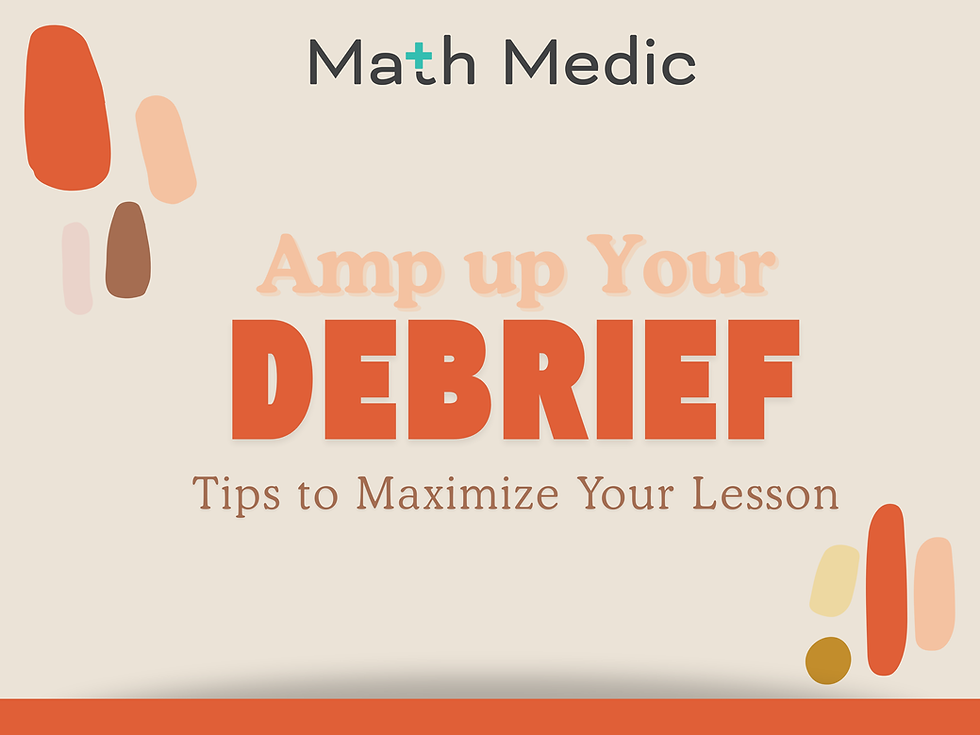Using Questions to Help Students Construct Understanding
- Lindsey Gallas

- Jan 20, 2020
- 4 min read
Updated: Feb 6
Every time I am working with a group of teachers and introducing them to EFFL, I get asked, “So do you have your students read the textbook the night before?” It is surprising to me how often this question comes up. I haven’t seen many high school math classrooms where reading before a lesson is required, so what is triggering this response?
I think at the root of this question is that teachers are wondering how students can learn new mathematical ideas if they haven’t received any instruction. How will students know how to answer the questions in the activity when they haven’t learned the content yet? Teachers are afraid that their students won’t know what to do and will be stuck staring at a blank page.
The answer is, it’s about how you ask the questions.
We’re going to talk about two different sets of questions that are important in an EFFL lesson:
The written questions posed in the activity
The verbal questions asked by the teacher while monitoring group work
The Written Questions
The first set of questions we think about are the questions that make up the activity portion of the EFFL lesson. We scaffold the questions intentionally so that they guide students from what they already know to what we want them to learn.
When writing an activity, we tend to follow this general structure where students:
Review or recall what they have already learned in previous lessons or courses.
Use that knowledge to investigate a new problem. (This usually consists of several scaffolded questions or parts.)
Reflect on and explain what they notice.
Connect their work to a more generalized mathematical idea.
The questions need an accessible entry point for every student. When I’m writing an EFFL lesson and need to scaffold questions, I think through what questions I would ask a student if I were sitting right there with them. What language would I use? How would I phrase it so that they would be able to answer the question? If they couldn’t answer my question, what would I ask next? How would I modify it?
For more information about how we create these scaffolded activities, read this post.
Our goal with the questions in the activity is that a group could complete the whole thing without teacher input since you will not be able to consult with every group on every question.
The Verbal Questions
Next we want to think about what questions we will pose to groups as they are working. During this time, we are walking around the room and checking in with groups. We look at their work, ask them to explain their thinking, answer clarifying questions, and pose extension questions.
Think about these questions in two categories: assessing questions and advancing questions. Assessing questions can be somewhat of a misnomer: the goal is not to evaluate students or give them a mark of some kind, but to understand the students’ thought process. Assessing questions help to draw out student thinking and investigate why a group decided to take a particular approach. Students practice explaining their reasoning to you. Stay and listen to the whole answer. You are the learner in this scenario and your goal is to clarify what students have done and parse out what students understand about what they have done and why they have done it. Assessing questions should start pretty general (“Can you tell me what you did?” “What is your group thinking so far?” “Talk to me about your approach.”) and then hone in on the specific strategies described by the group (“How did you decide to use ____ to represent your answer?” “What do the variables in your equation represent?”) How students answer these questions will help you to know what advancing questions to ask next. For more on assessing questions, read this post from Math Medic.
Advancing questions are questions we pose that move students’ thinking forward. These questions help draw students’ attention to key mathematical ideas and to make connections between their prior learning and the goals for the day’s lesson. They are not designed to be used as hints or to steer students toward our approach for solving a problem. Instead, they challenge students to generalize their strategy or think about particular aspects of their strategy in new ways. A best practice is to ask the group an advancing question and then walk away while they think and discuss. Take note of what question you asked them so you can circle back later and check in on their progress.
Monitoring and facilitating group work requires practice. It can be difficult to come up with advancing questions in the moment. Before teaching a lesson, take time to go through the activity as a student would, in order to anticipate student responses. Think of advancing questions that you can use based on a possible student approach and write them down. The more you teach these lessons and work with your students, the more natural these questions will become. You can often find suggestions for some of these assessing and advancing questions in the corresponding lesson post.



